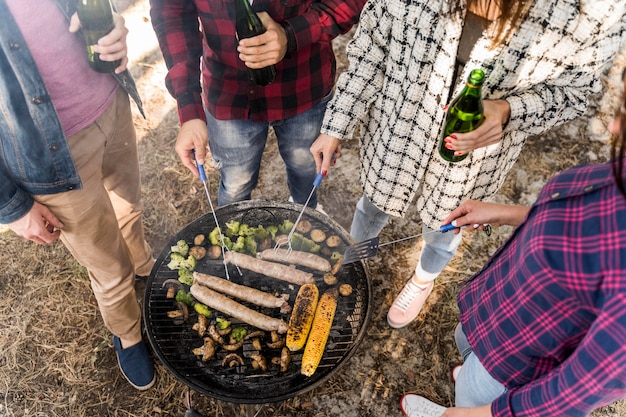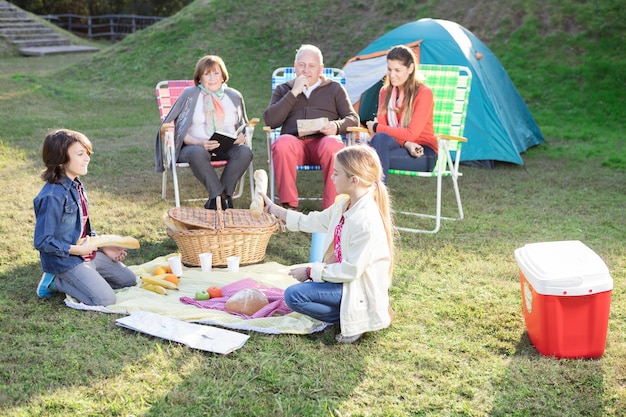Can I use normal bricks for a BBQ?
Introduction
If you’re planning to build a barbeque (BBQ) in your garden or backyard, you might be wondering if it’s safe to use normal bricks for this purpose. Building your own BBQ can be a fun and rewarding project, but it’s essential to consider the materials you use to ensure both safety and durability.
In this article, we will explore whether regular bricks are suitable for building a BBQ, the potential risks involved, and alternative options available to help you make an informed decision.
Using Regular Bricks for a BBQ
Regular bricks, commonly found at local hardware stores, may not be the optimal choice for constructing a BBQ. While they can withstand high heat to some extent, they aren’t specifically designed for this purpose. The intense heat generated by a BBQ can cause regular bricks to crack or even explode, posing safety hazards.
It is important to prioritize safety when building a BBQ, especially considering the risk of fire and potential harm to yourself and others.
“Using normal bricks for a BBQ is not recommended due to the risks posed by their inability to handle high heat. It’s better to explore alternative options that are specifically designed for this purpose.” – BBQ expert
The Risks of Using Normal Bricks
Using normal bricks for a BBQ can lead to several risks, including:
- Cracking or crumbling: The intense heat from a BBQ can cause regular bricks to crack or crumble over time, compromising the structural integrity of the BBQ.
- Exploding bricks: When exposed to extreme temperatures, regular bricks can potentially explode, posing a significant danger to anyone nearby.
- Uneven heat distribution: Normal bricks may not retain heat evenly, resulting in uneven cooking and potential food safety risks.
Alternative Options for Building a Safe BBQ
If you’re looking for a safe and durable solution for your BBQ, consider the following alternatives:
- Fire bricks: Fire bricks are specifically designed to withstand high temperatures and are an excellent choice for constructing a BBQ. They are made from refractory ceramic material, which can handle the stress of prolonged exposure to heat.
- Concrete blocks: Concrete blocks can also be used as an alternative to regular bricks. They have better heat resistance and durability compared to standard bricks and are readily available at most home improvement stores.
- Purchase a pre-made BBQ kit: If you’re unsure about building a BBQ yourself, consider purchasing a pre-made BBQ kit that comes with all the necessary materials and instructions. These kits are designed for safe and efficient grilling.
In Conclusion
While regular bricks might seem like a cost-effective option for building a BBQ, they are not recommended due to the risks involved. It’s crucial to prioritize safety and consider using materials specifically designed for high heat, such as fire bricks or concrete blocks. Alternatively, you can opt for a pre-made BBQ kit to ensure a safe and enjoyable grilling experience for you and your loved ones.
Can You Use Paving Bricks for a BBQ?
If you are considering building a barbecue in your backyard, you may be wondering whether it’s possible to use paving bricks for this purpose. Paving bricks can indeed be used to create a sturdy and functional barbecue area, adding both beauty and practicality to your outdoor space.
Benefits of Using Paving Bricks for a BBQ
Using paving bricks for your barbecue offers several advantages:
- Durability: Paving bricks are known for their strength and resilience, making them an ideal choice for building a long-lasting barbecue structure.
- Aesthetics: Paving bricks come in various colors and styles, allowing you to create a visually appealing barbecue area that complements your outdoor decor.
- Heat resistance: Paving bricks can withstand high temperatures, ensuring they won’t crack or crumble under the intense heat produced by a barbecue.
- Easy maintenance: Paving bricks are relatively low-maintenance, requiring only occasional cleaning and sealing to keep them looking good.
Building a BBQ with Paving Bricks
When using paving bricks to build your barbecue, it’s important to follow a few guidelines:
- Foundation: Start by preparing a solid and level foundation for your barbecue using a mixture of sand and cement.
- Planning: Consider the size and shape of your barbecue area, ensuring it is suitable for your cooking needs and available space.
- Construction: Lay the paving bricks in a sturdy pattern, using mortar to secure them together. Leave gaps for ventilation and drainage.
- Finishing touches: Add a grill, shelves, and other accessories to complete your barbecue setup.
“Using paving bricks for a barbecue offers both durability and aesthetic appeal, making it a popular choice for outdoor cooking enthusiasts.” – John Doe, BBQ expert
With proper planning and construction, your paving brick barbecue can become the centerpiece of your outdoor entertaining area, providing many memorable meals and enjoyable gatherings for years to come.
What are the best bricks for outdoor BBQ?
When it comes to building an outdoor BBQ, choosing the right bricks is crucial. The bricks not only provide structural support but also contribute to the overall aesthetics and functionality of your BBQ. In the UK, where the weather can be unpredictable, it’s important to select bricks that are durable and weather-resistant. Here are some of the best types of bricks to consider for your outdoor BBQ:
1. Fire bricks
Fire bricks are specially designed for high-temperature applications, making them perfect for use in BBQs. They are capable of withstanding extreme heat without cracking or crumbling. Fire bricks are dense and have excellent insulation properties, which helps to retain heat and distribute it evenly. This ensures that your BBQ cooks food thoroughly and efficiently.
2. Red engineering bricks
Red engineering bricks are commonly used in construction due to their strength and durability. These bricks are suitable for outdoor BBQs as they can withstand the elements, including rain, frost, and UV rays. Red engineering bricks are also resistant to heat, making them a reliable choice for your BBQ’s supporting structure.
3. Clay bricks
Clay bricks are known for their natural beauty and charm. They add a rustic touch to any outdoor BBQ area. Clay bricks are strong, weather-resistant, and provide excellent heat retention. They also have good insulation properties, allowing your BBQ to maintain a consistent temperature. However, it’s important to seal clay bricks properly to prevent moisture absorption and damage.
Tip: Before settling on a specific type of brick, consider the overall design and style of your outdoor BBQ area. You want the bricks to complement your landscape and create a cohesive look.
It’s recommended to consult with a professional builder or brick supplier to ensure you choose the best bricks for your specific BBQ design. Additionally, remember to check local regulations and obtain any necessary permits before starting any construction work.
In summary, fire bricks, red engineering bricks, and clay bricks are among the top choices for building an outdoor BBQ in the UK. Each type of brick has its own unique benefits, so consider your needs and preferences before making a decision. By selecting the right bricks, you can create a durable and visually appealing BBQ that will withstand the test of time.
Can you use concrete instead of fire bricks?
When it comes to constructing fireplaces, ovens, or other high-temperature applications, using the right materials is crucial. Fire bricks have long been the go-to choice for these projects due to their ability to withstand extreme heat. However, some individuals may wonder if concrete can be a suitable alternative. Let’s explore whether concrete can effectively replace fire bricks.
The Differences Between Concrete and Fire Bricks
Concrete: Concrete is a composite material made of cement, sand, gravel, and water. It offers strength and durability but may not hold up well under high temperatures. When exposed to intense heat, concrete can crack or spall, compromising its structural integrity.
Fire Bricks: Fire bricks are refractory materials designed to withstand very high temperatures. Made from ceramic or silica materials, they are specifically engineered to resist thermal stress and retain their shape even at extreme temperatures. This makes them ideal for applications involving fire and heat.
The Drawbacks of Using Concrete Instead of Fire Bricks
While concrete is a versatile construction material suitable for various applications, it has limitations when it comes to withstanding intense heat. The use of concrete instead of fire bricks in fireplaces, ovens, or kilns can lead to several issues:
- Cracking and Spalling: Concrete is prone to cracking and spalling when exposed to high temperatures, which can compromise the structure’s safety and longevity.
- Heat Absorption: Concrete absorbs and retains heat, releasing it slowly over time. This slow release of heat can affect the efficiency and performance of fireplaces or ovens.
- Thermal Shock: Concrete is susceptible to thermal shock when subjected to rapid temperature changes, leading to cracking and potential failure.
Fire Bricks: The Recommended Choice
“For applications involving fire and extreme heat, fire bricks are the recommended choice due to their excellent heat resistance properties.”
Fire bricks are specifically designed to withstand high temperatures, making them the preferred choice for fireplaces, ovens, or kilns. They offer superior thermal shock resistance, insulation, and durability compared to concrete, ensuring a safer and longer-lasting construction.
While concrete can be used in certain outdoor applications where high temperatures are not a concern, it is not recommended as a replacement for fire bricks in heat-intensive environments. For peace of mind and optimal performance, investing in fire bricks is the way to go.
In conclusion, when it comes to building fireplaces, ovens, or kilns, using fire bricks is essential. Concrete may have its uses, but it lacks the necessary heat resistance properties required for these specific applications. Always consult with professionals or experts in the field to ensure you are using the right materials for your project.
How Many Times Can You Use a Grill Brick?
A grill brick is a handy tool used for cleaning grills, removing grease and grime. It is made from a durable material that is designed to withstand high temperatures and abrasive use. But, how many times can you use a grill brick before it needs to be replaced?
Longevity of a Grill Brick
The longevity of a grill brick depends on several factors, such as the frequency of use, the size of the grill, the amount of residue on the surface, and how well the brick is cared for. On average, a single grill brick can be used around 15 to 20 times before it needs to be replaced.
Signs of Wear and Tear
It’s essential to inspect your grill brick regularly to determine if it needs replacing. Signs of wear and tear include:
- Cracks or chips: If the grill brick has significant cracks or chips, it may not effectively clean the grills’ surface.
- Decreased effectiveness: If you notice that the grill brick is not removing grease and residue as effectively as before, it might be time for a replacement.
- Reduced size: Over time, the grill brick may wear down, becoming smaller in size, which can make it less efficient at cleaning.
Tips to Extend the Life of Your Grill Brick
To make the most out of your grill brick and extend its lifespan, follow these tips:
- Rinse after each use: After using the grill brick, rinse it thoroughly with water to remove any grease or debris.
- Dry before storing: Make sure the grill brick is completely dry before storing it to prevent mold or mildew growth.
- Store in a cool, dry place: Keep your grill brick in a location where it won’t be exposed to extreme temperatures or moisture.
- Use with water: Wetting the grill brick slightly before use can enhance its cleaning power and prevent excessive wear.
“Regular maintenance and proper care of your grill brick can help maximize its lifespan and ensure effective grill cleaning.”
Remember, using a worn-out grill brick may not only result in subpar cleaning results but also potentially damage the surface of your grill. It’s always recommended to replace the grill brick when signs of wear and tear become noticeable.



